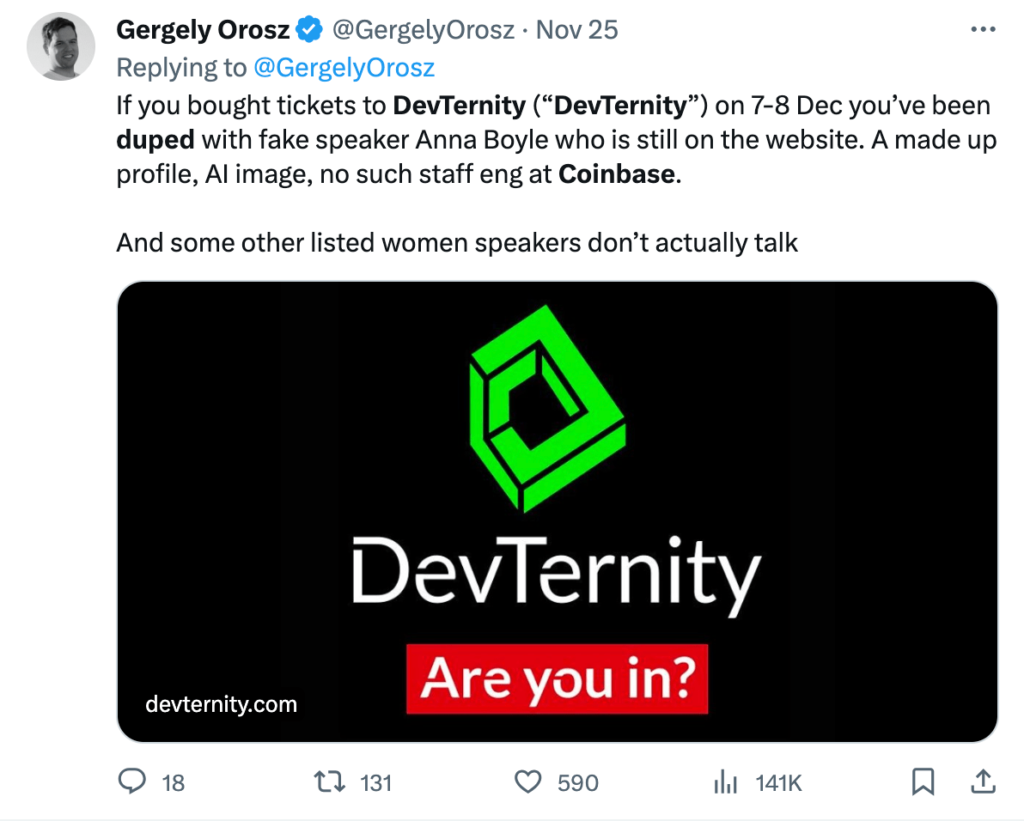Probably not the wisest move here…
Did you hear the one about the conference with fake female speakers? Not a knock knock joke, this is something that actually happened in 2023.
DevTernity, an online conference for developers, was canceled last week after being called out for including fake female speakers in its lineup. Conference organizers claim that the fake profiles were included as placeholders, taking the place of other (real, I hope) female speakers who had dropped out of the conference earlier. Conference organizers admitted that at least one profile was “auto-generated”, but they deny that the fabrication was intended to demonstrate that they had more diversity than they actually did — or did not, as the conference never actually happened.

Look, this is stupid. I think we can all agree this was an idiotic move on the part of the conference organizers and just about anyone else who was privy to this decision before it went live on their website. But how did something so small and so dumb even make it onto their site in the first place? That’s what fascinates me.
In today’s day of DEI (diversity, equity, and inclusion if you’ve been living under a rock) departments and diversity quotas, I certainly understand why people are scrambling to fill their conference rooms and speaker stages with more underrepresented individuals. And they should! These incredibly accomplished individuals have been given far too few opportunities to stand on stage and be recognized.
But when you’re falling short of your goal, what do you do?
Let’s put ourselves in the shoes of the conference organizers here. You’ve put in a great deal of work to plan a conference, lining up sponsors and speakers alike to support your agenda — in this case, “Turning developers into architects and engineering leaders” (according to the tagline on their now incredibly awkward website):

Anyone in the tech space can get behind this tagline. Feels good! Let’s help the individual contributors step up to the next level as strategic managers and leaders. But the tech space and especially engineering functions are notorious for being dominated by men. And again, in today’s day and age, the organizers undoubtedly knew how important it would be to demonstrate that they were elevating female voices in the room alongside the men. Maybe they wanted any women attending the conference to feel that they could see themselves up on that stage someday themselves, maybe they just got a quota from on-high and were told they had to meet it. Either way, the result is the same — the needed female speakers.
Not surprisingly, the number of female speakers (both real and imaginary) was always going to be low compared to the men because the tech industry is still quite heavily weighted towards male engineers. So they’re already working with a small absolute number. But then they start dropping out…what do the conference organizers do? Let’s run through a few different scenarios:
Scenario 1
Conference Organizer 1: ”Oh sh*t, with the recent dropouts we only have a single female speaker left”
CO2: “Damn, it’s really important that we have enough representation at the conference, let’s hustle and get in contact with more of the female developers we’d already been chatting with during the planning process and see if any of them are available.”
CO1: “But what should we do in the meantime? We have this awkward hole on the site, the UX will be misaligned if we just remove their profiles from the site entirely.”
CO2: “Just put a placeholder in there for now.”
CO1: “A blank one?”
CO2: “Huh, actually, why don’t you auto-generate a generic female profile? We know we want to fill the space with another woman even if we don’t know who yet. So better to show that to potential attendees than just having it blank.”
CO1: “Got it, off to ChatGPT I go…”
And as the conference nears and they still haven’t filled the slot…they sort of forget they even did it…
This is likely the rosiest scenario of how this could have played out. And really just shows the profound tone-deafness of a room full of all men (I’m just speculating here, but c’mon…), but probably no real malice. Sadly the options just get worse from here.
Scenario 2
In what I’ll call the middle ground scenario, the organizers still realize the importance of having a few women on the docket, but they simply can’t find any women to take the empty spots. This could be because during the planning process they didn’t get enough potential female speakers in their pipeline. Or it could be because their personal and professional networks simply don’t have many female developers in them. This again doesn’t represent any mal-intent on the part of the conference organizers, but it does beautifully illustrate the exact issue they’re supposedly trying to address by ensuring there are women speaking at the event in the first place — namely, that there aren’t enough female developers. And the ones that do exist are rarely invited into the room with other leaders, or beyond that rarely even introduced to those other (likely male) leaders so that they’d be aware of the women’s existence at times like these.
Scenario 3
At the worse end of the spectrum, we may have conference organizers who simply don’t care about actually having women on the agenda.
CO1: “Oh sh*t, we only have one female speaker left.”
CO2: “Who cares?”
CO1: “Well, we said we’d have x number of women speaking when we organized the conference.” or maybe “Well, people will expect there to be women on the agenda, companies are always getting called out for that these days.”
CO2: “Ah damn, you’re right.”
CO1: “So what should we do?”
CO2: “Well, let’s just throw up some placeholder women in the agenda. Who’s actually going to make a point to only see the female speakers at the conference anyway, right? So by the time the event actually takes place no one will notice. Just auto-generate some profiles so that we hit whatever quota. No one cares anyway.”
Did any of these scenarios actually play out with the conference organizers? Probably not, because I just wrote them now based on absolutely no concrete evidence. But that’s not the point. The point is that no matter which scenario most closely resembles what actually happened, we’re seeing a very interesting confluence of issues here.
If the conference organizers truly understood the importance and potential impact of having female speakers, and if they did really intend to fill the empty slot(s) with other women, then it would (or could) have been pretty straightforward to own up to the idiotic mistake when it was first noticed. But they didn’t. We see this play out over and over again in the media when people are called out for problematic behavior, no matter how small. Instead of seeing “oof, yeah, I can see how that looks bad but we really had a positive intent here and clearly missed the mark”, people deny, stonewall, or just stay silent.
We’re all learning here, and part of the learning process is making mistakes. Should we assume positive intent? Or is it better to call out the problematic behavior at full volume so people can feel the weight of their missteps?
If I had been the lone remaining female speaker on the agenda when this conference was called out, what would I have done? Would I have pulled out in protest, tried to contact the event organizers and introduce them to other women in my network who would make for great speakers? I’m personally a fan of giving people a little bit of room and grace to grow and evolve (within the realm of reason), so I probably would have leaned somewhere towards the latter. But there’s no black and white answer here, because these are complicated, decidedly not one-dimensional issues.
I hope you didn’t come to this post (or this site) for answers, because that’s not what we’re doing here. Instead, we want to recapture the nuance of these complex conversations that seems to be disappearing as of late.
And the issue of underrepresentation of women in male-dominated fields is not solved on the stages of virtual conferences. It stems from issues starting well before any of us hit puberty. So join me as we try to dissect, discuss, and probably don’t solve some of these issues that are playing out in the media. And in the meantime, if you’re organizing an event or conference, I think one thing we can all agree on is that you should not fabricate speakers or attendees to try to promote a level of diversity that you can’t achieve.
